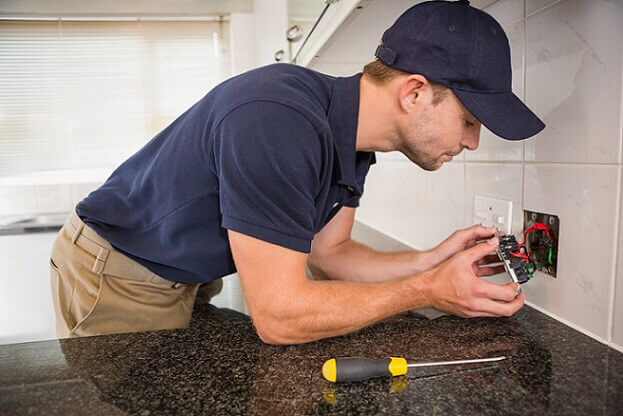What Are Common Signs of an Overloaded Circuit?
By recognizing the signs of a potential circuit overload, you can prevent further damage and significantly reduce upcoming repair bills.
Signs of an overloaded circuit include:
Losing Power Regularly
One of the most common signs of an overloaded circuit is the breaker tripping and shutting off power to the home. This power loss occurs when you exceed the rated load for the circuit and the breaker cuts off the supply to prevent the wiring from overheating and causing a fire.
Buzzing Noises from the Outlet or Breaker
A buzzing outlet signifies an urgent electrical issue requiring expert analysis by an electrician. The circuit has likely overloaded, and the breaker hasn’t tripped, potentially causing a fire.
Lack of Power in Electrical Appliances
When you’re experiencing a circuit overload, you may also find electrical appliances and power tools lack the power they need to run effectively. You could struggle to use power tools during home DIY projects or discover your oven no longer reaches the optimal temperature.
Flickering Lights
Lights flicker in your home when they don’t get an adequate electrical supply. Continual issues with flickering lights are associated with a panel that doesn’t have the supply to meet the power demand throughout the home. Lights dimming and flickering can also give you a sign as to the cause of your power supply issue. For example, if the kitchen lights dim when you turn on a toaster oven, that’s an indicator that the lights and toaster oven are on the same circuit, and it’s close to an overload. The visual element of the flickering lights sometimes makes them the most obvious first sign of an overload.
What Can I Do to Avoid an Overloaded Circuit?
Proactively updating your home electrical components can help you avoid continual overloads in the future. Below are several steps you can begin to take to prevent circuit overloads and ensure a consistent electrical supply to the home.
Inspect Your Wiring
Walk through the home and inspect your wiring to check for frayed wires and loose electrical outlets. Fraying wires occur in homes with repeated circuit overloads as the wiring is subject to high heat and electricity, which damages the insulation. Replace any fraying wiring as soon as possible to minimize the potential damage associated with overloads.
Don’t Overuse Outlets
Spread appliances, particularly high-demand appliances, around the electrical outlets in the home. Never plug two high-draw devices into the same outlet, as this can cause an overloaded circuit, even in homes with modern circuitry. Large appliances such as ovens, dishwashers, and air conditioners should have their own separate outlets.
Upgrade Appliances
Older, less-efficient appliances place a heavy demand on your electrical circuit. One way to avoid overload is to upgrade larger equipment to Energy Star-qualified alternatives to minimize power consumption. Installing energy-efficient refrigerators, ovens, dishwashers, and air conditioners can limit the amount of electricity your home requires.
Upgrade Your Panel Capacity
While upgrading your appliances might help limit the demand on your circuit, you may add more electrical products to your home in the coming years. Perhaps you’re considering an electric car or planning to upgrade a basement? Your local electricians can upgrade your electrical panel to meet modern performance standards, immediately preventing overloads and offering the potential to add more equipment to your home over the years ahead.
Talk to an Electrician to Prevent Overloads and Improve Performance
Custom Electrical Services’ electricians have decades of experience responding to electrical panel overloads. We offer 24/7 responses to potential electrical panel emergencies and can respond in minutes when you need urgent electrical services. From inspection and analysis to expert repairs and upgrades, we’re the trusted Iowa leader for electrical projects. Contact our team today to speak with a local electrician.



